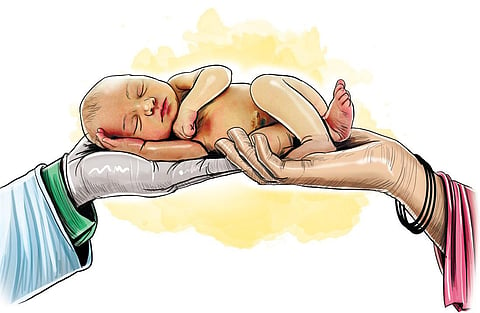

With COVID-19 fears among the general public, one section of society – expecting and new moms – is panicking a little more as not enough information has been discharged on how to handle special cases like theirs. After all, it can result in a tragedy with both the mother and the child getting infected. However, the medical community dismisses this fear psychosis with one advice – just take extra precautions. This is in addition to the guidelines stated by the Federation of Obstetric and Gynaecological Societies of India (FOGSI) – social distancing, staying at home, hand hygiene, and respiratory hygiene (deep breaths and pranayam).
“In the next three months, India will have at least a lakh mothers delivering babies in India,” predicts Dr Nitika Sobti, Principal Consultant, Max Super Speciality Hospital, Gurugram. She says that pregnant and new mothers should follow the same set of precautions like the rest of the population, “but they should also be aware that their immunity system is low. The woman has increased heart rate because there is more load on the heart, lung capacity is diminished because of the growing abdomen that pushes the lungs upwards, which makes her more prone to catching the virus.”
If an adult and pregnant woman get infected by the virus, chances of contracting pneumonia or respiratory infection are higher in the woman. “Again, that doesn’t mean she is more prone to contracting the infection,” Sobti adds. Doctors are also taking extra cautions with their patients, who are to-be mothers. Like Raka Guleria, Senior Consultant, Obs and Gynae, Fortis La Femme, GK 2, who says, “I see how far the pregnancy has reached in each of my patients, and on the basis of that, I first call them at 11-14 weeks to make sure there’s no problem with the baby, and then call them around the fifth month for the Level 2 ultrasound, and then in the third trimester.
Rest can be told through tele consultation, as hospital visits should be minimised.” Another area he stresses upon is their food intake. “Diet is of utmost importance. They should eat healthy food in small quantities every two hours. Ensure more intake of protein and less of fat. Add nimbu or nariyal pani to your diet. As they can’t go for a walk now, they should include some kind of light workout in their daily routine.” Dr Kaberi Banerjee, Medical director, Advance Fertility and Gynaecology Centre, New Delhi, also comments how doctors are discouraging regular visits. “We make it a point to elicit any symptoms similar to the virus and history of travel abroad at every clinical visit. The FOGSI guidelines say the antenatal visits should continue in the same way.
A lot of doctors are not encouraging physical visits. If a recent ultrasound has been done, they prefer doing it through tele consultation. Some clinics are making the patients wait in their cars for physical visits, so there is minimum interaction. Still, if a mom-to-be gets the virus, there are medicines such as azithromycin, hydroxychloroquine, and anti-viral therapy like lopinavir can be administered but they are still being done on an experimental basis.” Though no vertical transmission to the baby has been noticed, the newborn is at risk because it comes into physical contact with the mother. “A few studies from Wuhan area of China observe there was a high incidence of pre-term labour, but it’s not transmitted to the baby,” adds Banerjee.
For moms who resume work post their maternity leave, Guleria adds, they need to be extra careful when they want to feed the baby. “Change your clothes after coming back from work, wash them, and dry them in the sun as it kills virus, and take a bath.” The need of the hour is to disseminate the right information. “It is good to know that the virus doesn’t affect the baby when it’s inside the mom. Zika Virus was a lot scarier because it led to birth defects. But now, just know you are safe if you take these precautions properly,” advices Sobti.